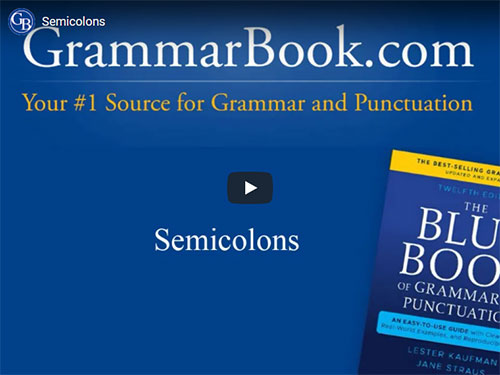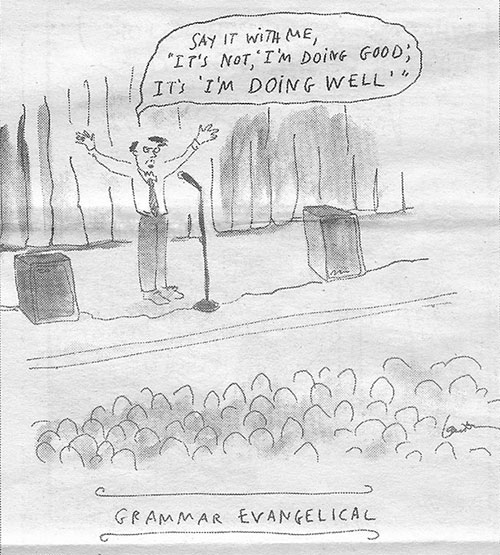|
Having trouble viewing this message? Click here to view it online.
To unsubscribe or change contact details, scroll to the bottom and follow the link.
|



|
|
Grasping the Grammatical Expletive
|
|
There is/are…, It is…: We often use these constructions in communicating, perhaps without being
aware they have a grammatical classification, the expletive.
Expletives introduce clauses and delay sentence subjects. Unlike nouns and
verbs, which have well-defined roles in expression, expletives do not add
to sense or meaning; rather, they let us shift emphasis in sentences by
using "filler." For this reason,
expletives are sometimes referred to as "empty words."
There is/are
and it is are the two primary expletive clauses. Because the words
are unnecessary, sentences are tighter without them. Including the
expletive depends on whether we want to delay the subject for emphatic effect. Note the nuance and intent in the following
examples.
Sentence with expletive there:
There is
a toy airplane on the grass in the backyard.
Sentence without expletive:
A toy airplane is on the grass in the backyard.
Sentence with expletive it:
It is
a fact that he is a former Elvis impersonator.
Sentence without expletive:
He is a former Elvis impersonator. |
The sentences with expletives stress the subject instead of the verb by
postponing its normal syntactical placement. Examples of expletives for
emphasis abound in English literature. Here is but one from Samuel Taylor
Coleridge's poem "The Rime of the Ancient Mariner":
"There passed a weary time. Each throat
Was parched, and glazed each eye." |
Coleridge uses the expletive there to emphasize "weary
time" by having it follow rather than precede the verb.
Expletives' status as filler does have exceptions. For instance, when
a sentence's subject is an infinitive phrase or a that
clause, starting the sentence with the expletive it instead of the
subject sounds more natural.
Original sentence:
To train at least four weeks for the event is crucial. (less natural)
Sentence with expletive it:
It is
crucial to train at least four weeks for the event. (more natural)
Original sentence:
That she will win the local election is certain. (less natural)
Sentence with expletive it:
It is
certain that she will win the local election. (more natural) |
The expletive it also serves constructions that do not have a
concrete subject.
Examples
It is
cold outside.
It is
getting a bit loud over there.
It could
turn out to be better than we thought. |
In using and understanding expletives, we also want to identify when there and it are not operating as such. There
frequently functions as an adverb, and it is often a pronoun
referring to an antecedent.
There as expletive:
There are
six members at the meeting.
There as adverb:
Six members are there at the meeting.
It as expletive:
It is
a good idea to save money for the trip.
It as pronoun:
Saving money for the trip is a good idea. It is something we
should do. (The gerund phrase Saving money for the trip is the
antecedent to which It refers.) |
As illustrated, expletives can add style and even needed duty to our
writing. At the same time, we should include them with reserve. Like the
passive voice, they can weaken writing if used too freely. The occasional
expletive with thoughtful placement can help keep writing rich and
resonant.
|
View and comment on this
article on our website.
|
|
|

|
 |
The Blue Book of Grammar and Punctuation
by Lester Kaufman and Jane Straus |
The Authority on English Grammar! Twelfth Edition Now Available
An indispensable tool for busy professionals, teachers, students, homeschool families, editors, writers, and proofreaders.
Available in print AND as an e-Book! Over 2,000 copies are purchased every month!
To order the book, simply click the link to order the book from the GrammarBook.com website.
|
Free BONUS Quiz for You!
Friend, because you are a subscriber to the newsletter, you get access to one of the Subscribers-Only Quizzes. Click here to take a Confusing Words and Homonyms Quiz and get your scores and explanations instantly!
We will be adding many more quizzes this year to our already substantial list of them. If you have suggestions for topics we have not yet covered, please send us a message at help@grammarbook.com.
|
Hundreds of Additional Quizzes
at Your Fingertips
Subscribe now to receive hundreds of additional English usage quizzes not found anywhere else!
Teachers and Employers
Save hours of valuable time! You may assign quizzes to your students and employees and have their scores tallied, organized, and reported to you! Let GrammarBook.com take the hassle out of teaching English!
"Fun to test my skills."
"The explanations really help ... thanks!"
"I can select the quizzes to assign to my students, and then the results are reported to me automatically!"
If you think you have found an error in a quiz, please email us at help@grammarbook.com
|
Wordplay

|
 |
English In A Snap:
68 One-Minute English Usage Videos FREE |
Learn all about who and whom, affect and effect, subjects and verbs, adjectives and adverbs, commas, semicolons, quotation marks, and much more by just sitting back and enjoying these easy-to-follow lessons. Share them with your colleagues (and boss), children, teachers, and friends as well! Click here to watch.
|
|